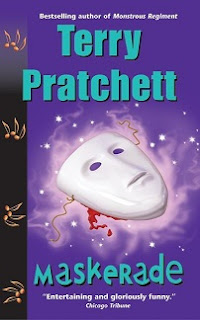 Agnes Nitt leaves her small town to try and make it as a singer in the capital city of Ankh-Morpork. Goaded by Perdita X (her alter ego, or, as she figures it, the thin person inside her), she gets a part in the chorus of the city opera. The flighty world of opera rubs her common-sense self the wrong way, with all this talk of luck, superstitions, and the ghost of the opera house who wears a bone-white mask. When the ghost starts killing people, though, she has to put her doubt aside and try to solve a very real mystery.
Agnes Nitt leaves her small town to try and make it as a singer in the capital city of Ankh-Morpork. Goaded by Perdita X (her alter ego, or, as she figures it, the thin person inside her), she gets a part in the chorus of the city opera. The flighty world of opera rubs her common-sense self the wrong way, with all this talk of luck, superstitions, and the ghost of the opera house who wears a bone-white mask. When the ghost starts killing people, though, she has to put her doubt aside and try to solve a very real mystery.Terry Pratchett combines Monty-Pythonesque humour, fantasy, Dickensian plots, and a wit all his own into an irresistible combination. There are a lot of great characters: Granny Weatherwax and Nanny Ogg, two do-gooder witches trying to get Agnes to join their rational coven; Mr. Bucket, the cheese merchant who bought the opera house as an easy retirement; Christine, the ditzy soprano who never speaks with less than two exclamation marks; and of course Death, who shows up at the most inconvenient of times.
Plot-wise, this is a pretty straightforward adaption of Gustav Leroux's Phantom of the Opera, combined with the shift toward popular musicals of the 60s and 70s. With the source material worn right on the sleeve, there isn't much subtlety, but the characters and the comedy keep things interesting throughout.
The comedy is pretty delightful. In this scene, the witches are attempting to purchase Box Eight, which is always reserved for the ghost. Nanny recently came into some money, and Granny is rapidly spending it:
"It's only money."
"Yes, but it's only my money, not only your money," Nanny pointed out.
"We witches have always held everything in common, you know that," said Granny.
"Well, yes," said Nanny, and once again cut to the heart of the sociopolitical debate. "It's easy to hold everything in common when no one's got anything."
"Why, Gytha Ogg," said Granny, "I thought you despised riches!"
"Right, so I'd like to get the chance to despise them up close."
Or we have the inner monologue of the director of the opera, in moral turmoil because he has been ordered to have Agnes sing Christine's solo while Christine mouths the words center-stage:
What did it matter what shape [Agnes] was? Dame Tessitura had a beard you could strike a match on and a nose flattened half across her face, but she was still one of the best basses who ever opened beer bottles with her thumb.
There are many hilarious assessments of opera in general, perhaps one of the best being Nanny's interpretation:
"Well, basically there are two sorts of opera," said Nanny, who also had the true witch's ability to be confidently expert on the basis of no experience whatsoever. "There's your heavy opera, where basically people sing foreign and it goes like 'Oh oh oh, I am dyin', oh, I am dyin', oh, oh, oh, that's what I'm doin'', and there's your light opera, where they sing in foreign and it basically goes 'Beer! Beer! Beer! Beer! I like to drink lots of beer!', although sometimes they drink champagne instead. That's basically all of opera, reely."
You can flip to almost any page in this book and find something funny (or at least amusing). That alone recommends it, even if the story in this one is a little weaker than other Pratchett books I've read.
Arbitrary rating: 4 out of 5 hearts of the sociopolitical debate



